Following the selection of Ban Ki Moon, I highlighted some remarks by some observers of the race and expectations for the UN under Ban’s leadership. Much more was written however and only a lack of time has prevented me from highlighting them.
One particularly important topic which has been woefully under-examined was the economic aspects of the selection process. Scott Lyons looked at this in a thought-provoking comment on the aid-packages-of-interest from South Korea which were offered to several non-permanent members of the Security Council during Ban’s campaign trips.
Further, Ban Ki-Moon had negotiated several trade agreements with countries that chose the next Secretary General, thus placing himself to be in a position to be rewarded for these financial connections that enrich nations. Ban Ki-Moon is without question highly qualified to be the next Secretary General. The question is whether this has ushered in an era where economic considerations play a role in choosing this position.
While most observers eventually dismissed the accusations as insubstantial (and meaningless), the Wall Street Journal caved to neo-conservative angst about the UN, suggesting there must be a “culture of corruption” (to borrow a phrase from recent U.S politics) and that Ban was joining in.
…it is telling that the South Korean Foreign Minister helped secure his new post with blandishments and pledges of aid to some of the Security Council countries that voted on him. Judging from the record of U.N. scandal, he’s right to conclude that what really talks at Turtle Bay is money.
More thoughtful observers, however, will recognize Scott’s point as a much more tangible concern in the selection of the UNSG, particularly if reforms toward a more open, competitive selection process continues. The economic costs of campaigning may pose difficulties for the small or middle power countries from which the eventual nominee has traditionally been chosen. In fact, it may already have had an impact.
The high costs of running a global campaign have handicapped secretary general candidates from some of the United Nations’ least powerful countries, who previously fared well in races for the top U.N. post. Jayantha Dhanapala, a Sri Lankan diplomat and one of the candidates, said it has been “impossible to mount the high-cost, high-budget campaign” that a president, foreign minister or top official from a wealthier country can afford. “I can only assume that some of the candidates have been able to do more extensive travel than I’ve been engaged in.”
Bill Pace with the UNSGselection.org coalition suggested that this development makes a General Assembly review of the selection process more critical now, not less. Pace has reminded colleagues that South Korea is the 11th largest economy in the world. Even putting aside the issue of nukes in North Korea, this makes it far from a small power disinterested in global power politics.
As has been referred to before, one of Ban’s fellow candidates, Latvia’s Vaira Vike-Freiberga noted in an interview last April some concern over how economics could taint a competitive UNSG selection process.
“I would hate to see the selection of the secretary general being the sort of a process where candidates run around the world looking for financial supporters, where financial supporters affect the selection process and where votes are bought. It opens up a rather horrifying prospect.”
Anonymous insider TopAppointmentsAdvisor suggests some guidelines might be in order, noting that “the elections for the top international posts have indeed transformed into a major business…”
Scott, Bill and TAA may be on to something here. But are governments and civil society still interested?

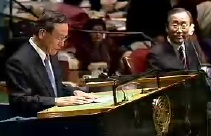
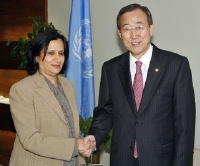 The General Assembly
The General Assembly 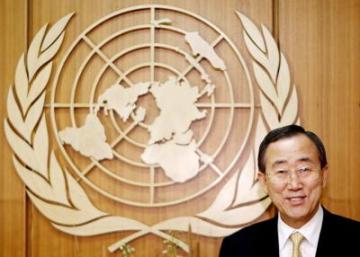
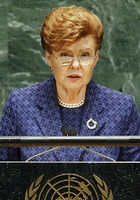
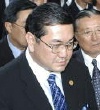 Thai candidate Dr. Surakiart Sathirathai has decided to end his 2-year campaign for UNSG.
Thai candidate Dr. Surakiart Sathirathai has decided to end his 2-year campaign for UNSG.



